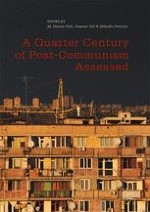2017 | OriginalPaper | Chapter
Chapter 3: Trajectories of Political Development in the Post-Soviet States
Author : Graeme Gill
Published in: A Quarter Century of Post-Communism Assessed
Publisher: Springer International Publishing
Activate our intelligent search to find suitable subject content or patents.
Select sections of text to find matching patents with Artificial Intelligence. powered by
Select sections of text to find additional relevant content using AI-assisted search. powered by
